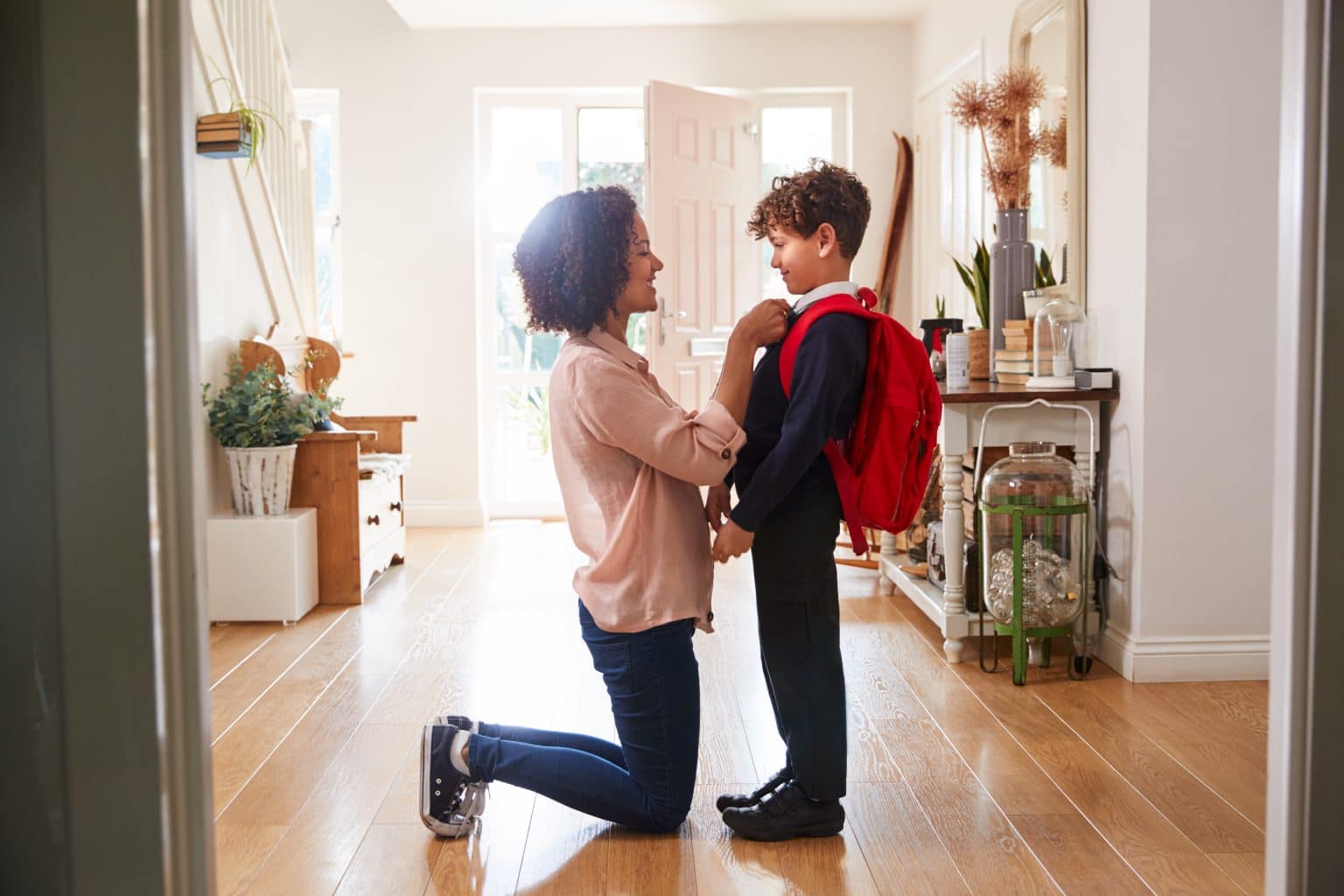It can be difficult to know what makes a difference in terms of preparing for and supporting your child at school. We spoke to long-time educator Lindsay Watson for her tips on how to help your child succeed at school.
Ah, September. Right around the corner. A new school year beckons, and, while some of us are thinking only of packing those irksome lunches (sigh), many parents are still thinking about how things went sideways last year, be it in the classroom, out on the playground or after school come homework time. To help you start the year off on the right foot, and make helpful habits early on, we turned to Lindsay Watson, a long-time teacher, guidance counsellor, student success teacher and now the vice-principal at a secondary school in the Greater Toronto Area. Read on for her expert advice, as both an educator and a parent, about how to set your student up for success.
ParentsCanada: Developing a partnership with teachers and school administration is certainly important. Some parents volunteer in the classroom to get involved, but we know many working parents can’t participate in this way. If this is the case, how do we develop a rapport with teachers and how “in their face” should we be?
Lindsay Watson: The challenge for parents, especially as their children get older and grow into their independence, is determining how much is enough involvement and how much is too much. I suggest parents continue to take an active role in their child’s schooling throughout kindergarten to Grade 12, but this can look different from family to family.
More and more, teachers giving parents the opportunity to share important details about their child at the start of the school year, either in a questionnaire, learner portrait or opening letter. I strongly encourage parents to participate in these activities. This information is really impactful in the classroom and can deeply support a student’s long-term success. Sharing your child’s strengths, needs, interests, family structure, skills and passions gives teachers the chance to shape learning and assessment opportunities to best suit them.
If these opportunities are not provided, I encourage parents to connect with the classroom teacher—set up a phone call or write a note to share your goals for your child this year and include strategies that support their learning and/or the ways you are able to support their learning as a parent partner.
Whether you can participate in the school’s parent council to help shape the school’s vision, volunteer in the classroom, show up to the holiday or talent show or even just use their agenda to communicate regularly with the teacher, it has an incredible impact to your child’s success.
PC: Having to deal with kids’ homework is daunting. While many parents make sure their kids complete their homework, most of us don’t know how involved we should be. What do you suggest here, and what if we simply can’t help—either because we can’t fit everything in, we aren’t gifted in certain subjects, we don’t speak the language, etc.?
LW: There is a lot of data and research now on the effectiveness of homework and if it does anything to improve students’ knowledge acquisition. Research indicates it doesn't have the impact we once thought it did. I think homework should be seen as a way of establishing a routine and build the child’s skills around organization, time management and responsibility. It should not consume hours of a child’s night. Homework should also be age-appropriate and encourage a child’s engagement in their learning. In the primary and junior years, reading for 10 to 15 minutes a night is a perfect way for parents and children to engage in homework while building literacy skills. When children get to middle school and high school, I would suggest no more than 30 minutes and 60 minutes, respectively. A social worker gave me the best advice in this area and it’s the one rule I had in my own home around homework. She said, “Evenings are your time.” I learned I wasn’t going to let homework ruin our evening or cause friction between me and my children. My nights were meant to be for my family, their extracurriculars and all the wonderful learning that comes from those things. Additionally, it wasn’t my job as the parent to teach my child the content. So, if my children didn’t understand what they were supposed to do, I sent a note to the teacher letting them know that they would need to spend some extra time getting my child up to speed.
One final note on homework. As a mother of two neurodiverse children, I recognized the amount of energy and focus that went into learning during the day was so great that they often got home and were too exhausted for homework. As educators, we sometimes do not know what it looks like once kids get home. Parents need to share this with teachers so that they can align with your child’s needs.
PC: Besides ensuring kids spend enough time doing their homework, studying for tests, etc., how can parents support their kids’ learning at home? The obvious one is to encourage them to read, but what other tips do you suggest?
LW: Some of the best learning opportunities for children have nothing to do with what can be found in a textbook or worksheet. The best way that parents can support learning at home is to encourage their children to connect, wonder, create and explore. Connection with family and friends is pivotal to development, especially in the areas of empathy, communication, cooperation and respect. Children should be encouraged and taught how to develop, maintain and, when necessary, repair relationships. Build a network around your children that is diverse and provides a variety of life experiences, beliefs and ideas. The connections made and skills built will serve your children in the classroom and beyond.
Wonder and exploration are amazing ways to help your children learn and grow. Each child develops their own interests, skills, hobbies and passions. Whether that’s joining a community sports team, art class, book club or choir, the more children get to explore and experiment with different interests and activities, the more confident, focussed and brave they become. Creation is also key. Give a student in Grade 2 a recycling bin of trash and see what incredible things they create. Ask a teen in Grade 10 to conceptualize an app for their phone that will solve a problem they deal with daily and watch the sparks fly. Children have solutions to a lot of our challenges because they don’t see limitations the same way adults do—we just have to give them the space to create these answers.
PC: School is more than academics—it’s also about social and emotional development. How can we help our kids recognize possible friends and nurture these relationships? What can we tell them about social cues?
LW: Schools have seen a drastic change in students’ social-emotional skill and capacity in the aftermath of the pandemic. There was a real disruption in the natural order of relationship building. School and home must work together to support the development of these lost skills and support students in finding healthy ways of navigating hard situations.
Parents can help children develop their social-emotional capacity by modelling empathy, helping children express their emotions, demonstrate kindness and take an interest in their neighbours and community. Parents can also support their children in navigating challenges by understanding different perspectives, developing communication tools and language, and practicing the process of apologies and repair. It’s important for children to understand challenges won't always be resolved exactly the way they want, but there is an important lesson in repairing relationships with dignity and compassion that doesn’t always require a solution where “we’re right and they’re wrong.”
During COVID, when in-person connections were severed, we saw a lot of children begin to develop and maintain relationships through social media. Social media, while amazing to keep our kids connected in a time of isolation, also generated a lot of new challenges kids don’t know how to manage. Parents should be actively monitoring their child’s social media activity, including knowing who they are connecting with, what they’re discussing, which apps they’re using and how they present themselves in online spaces. Establish rules about where devices are charged, hours of use and parental password access. There’s been an increase in online bullying, anxiety, depression and self-harm, so establishing healthy boundaries and strategies to disconnect is vital.
PC: Some kids play the “I don’t want to go to school” or “I have a tummy ache” cards because they’re upset about social stuff (bullies, friends who aren’t being nice, etc.). What can parents do when there’s social drama that’s affecting kids at school?
LW: Set boundaries for your children and establish a clear value system. Kids with a strong moral compass are really bothered by drama. Give them the tools to have an “out” and keep the communication channels open. Ask direct questions like, “Is someone in your friend group being hurt by the words or actions of others?” “Do you ever feel uncomfortable in your friend group? If so, what made you uncomfortable?” “Have you ever felt like you wanted to take a break from one of your friends? What did they do that made you want the break?” “Who in your friend group always makes others feel important?” Most of the drama is happening in spaces where there isn’t adult supervision, so we must seek it out. Once you have a better understanding of what kinds of behaviours are causing the drama, you and your child can set boundaries and practices to help them have an “out.” These can look like equipping your child with language, “Sorry guys, have to leave this chat because my mom has my phone password and if she reads this conversation, I’m in big trouble,” or “My dad is so strict, he makes me plug my phone in on the counter at 8 p.m.” These kinds of “outs” help kids establish limits and build healthy habits to avoid the drama. It also allows them to remove themselves without fall out because they can “blame” you, the parent.










